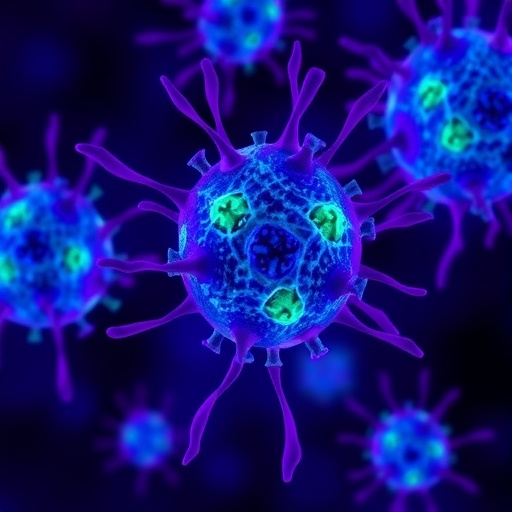Recent advancements in immunology have illuminated the intricacies of T cell regulation, especially concerning the transition of naive CD4+ T cells from quiescence to an activated state. The exit from this quiescent state is a critical response to antigen stimulation, which primes T cells for immune challenges. A recent study highlights the pivotal role of the RNA binding protein La-related protein 4 (LARP4) as a significant checkpoint regulator influencing this transition. This discovery opens exciting avenues for immunotherapeutic strategies aimed at autoimmune and allergic diseases.
The researchers employed a conditional knockout model to investigate the functions of LARP4 in naive CD4+ T cells. They discovered that the deletion of LARP4 resulted in a striking maintenance of the quiescent state. This inability to transition out of quiescence may be attributed to altered messenger RNA stability, critically influencing the activation pathways necessary for T cell function. The study elucidates how a single protein can act as a gatekeeper for T cell readiness, underscoring the importance of mRNA regulation in immune responses.
Interestingly, the study reveals that beyond merely influencing quiescence, LARP4 also plays a crucial role in the differentiation of naive CD4+ T cells into specialized helper T cell subsets. The findings suggest that when LARP4 is ablated, there is a consequential impairment in the cells’ ability to differentiate properly, which may contribute to abnormal immune responses. These insights provide a nuanced understanding of how quiescence exit and differentiation are interconnected, shedding light on potential therapeutic targets for immune-driven disorders.
Moreover, the researchers crafted a novel peptide inhibitor of LARP4, named LIPEP. The effectiveness of LIPEP is particularly noteworthy; treatment with this inhibitor not only emulates the effects of LARP4 deficiency but also significantly mitigates the severity of autoimmune and allergic diseases in mouse models. This step is particularly crucial as it emphasizes the translational potential of targeting LARP4 pathways in therapeutic contexts. By harnessing the capability of LIPEP, scientists may pave the way for innovative approaches to manage and treat chronic immunological conditions.
The role of RNA binding proteins, particularly LARP4, cannot be overstated. These proteins are essential for regulating the stability of mRNA, which dictates the expression of genes pivotal for T cell activation and function. In the case of LARP4, it appears that its regulatory actions are vital for maintaining the balance between immune tolerance and reactivity, influencing both the pathway of quiescence exit and the subsequent decision-making process concerning cellular differentiation.
With the prevalence of autoimmune and allergic diseases on the rise globally, unraveling the mechanisms of T cell regulation becomes increasingly critical. Interventions targeting LARP4 may potentially provide new, effective strategies for minimizing the impact of these conditions, which often manifest with debilitating symptoms and significant healthcare burdens. Researchers suggest that further investigations will be needed to elucidate the broader implications of LARP4 activity across different T cell populations and disease states.
The implications of these findings extend beyond basic science; they raise intriguing questions about the utility of modulating RNA stability as a therapeutic approach. Given that the LARP4 pathway could be manipulated, researchers can explore various strategies to either enhance or inhibit T cell responses as desired. Therefore, understanding how to control LARP4’s activity could lead to new paradigms for managing immune responses in conditions ranging from allergies to autoimmune diseases.
As this study gains traction in the scientific community, it could catalyze further research aimed at unraveling the complex regulatory networks that sustain immune homeostasis. Identifying the molecular cues that inform the quiescent state and transition into action could unlock not only therapeutic strategies for autoimmune diseases but also enhance vaccine responses in infectious diseases.
In sum, the research showcasing LARP4’s role in regulating naive CD4+ T cell quiescence and differentiation signifies a monumental leap forward in our understanding of T cell biology. As specialists from varying fields converge to explore this newfound knowledge, the potential for innovative therapeutic strategies to emerge appears increasingly promising, beckoning a new era in the treatment of immune-mediated illnesses.
Ultimately, the possibilities for harnessing LARP4’s mechanisms are profound, allowing for targeted interventions that can tailor immune responses. Such advancements would not only improve clinical outcomes for patients suffering from autoimmune and allergic diseases but also enhance our overarching understanding of immune system functionality. The prospective future of immunology may very well rest upon the manipulation of pathways governed by such pivotal proteins, marking LARP4 as a critical focal point in both current research endeavors and therapeutic explorations.
As more researchers turn their attention to the field of RNA binding proteins, the impact of LARP4 on T cell biology could inspire novel studies that explore the intricate interactions between RNA stability, immune quiescence, and cell differentiation. The ramifications of these investigations are profound; finding ways to manipulate these pathways could revolutionize how we approach immune-related diseases and ultimately lead to improved strategies for disease management and patient care.
Subject of Research: The role of LARP4 in regulating quiescence in naive CD4+ T cells and its implications for autoimmune and allergic diseases.
Article Title: Inhibition of LARP4-mediated quiescence exit of naive CD4+ T cells ameliorates autoimmune and allergic diseases.
Article References:
Zhou, J., Yang, D., Han, C. et al. Inhibition of LARP4-mediated quiescence exit of naive CD4+ T cells ameliorates autoimmune and allergic diseases.
Nat. Biomed. Eng (2025). https://doi.org/10.1038/s41551-025-01514-5
Image Credits: AI Generated
DOI: 10.1038/s41551-025-01514-5
Keywords: LARP4, CD4+ T cells, quiescence, autoimmune diseases, allergic diseases, RNA stability, immunotherapy.




